
When only 1 in 4 American businesses aren’t using a CRM platform, the question isn’t “should you use a CRM?” It’s “which one should you use?”
HubSpot is one of the most popular CRMs out there, but it’s not always the best option. For some founders, there’s just too much going on (meaning they need expensive consultants to get things working right). For others, it’s just way too pricey. You can start with a free plan, but costs add up quickly as you use more hubs and features..
So you know you need a CRM, something like HubSpot. Just not HubSpot.
Here’s a guide to the best HubSpot alternatives out there, specifically for founders of small businesses.
How we score HubSpot alternatives
We wanted to get away from the subjective lists that often rank your options based on little more than personal preference, so we actually scored each HubSpot alternative in this list according to the factors that really matter to founders:
- Price and pricing model: When you’re running a small business, every dollar counts. That’s why we analyzed pricing models for each option below, focusing on the total cost for five to 25 users.
- AI automation: The purpose of a CRM is to automate the repetitive, administrative parts of customer relationships so you can focus on the parts where your attention really matters. AI is essential to this.
- Ease of use: Can the CRM be deployed in 30 minutes or less? Are free trials offered? Do you need extensive training to get the most out of it?
- Integration ecosystem: A CRM needs data from calendar tools, email platforms, e-commerce tools, and more. This score takes into account built-in integrations for these common tools.
- Scalability: Your CRM needs to support you when you start small and when you’re growing. This score covers growth from five to 100 users, and how much you can expect to pay.
HubSpot alternatives: The scores
| Platform | Price score | AI score | Ease of use score | Integration score | Scalability score | Final score |
| Clarify | 8.5 | 9.5 | 9.0 | 7.0 | 9.0 | 8.67 |
| Salesforce Starter | 7.0 | 8.5 | 7.0 | 9.5 | 9.5 | 8.0 |
| Zoho CRM | 9.5 | 7.5 | 8.0 | 8.5 | 8.0 | 8.4 |
| Pipedrive | 8.0 | 7.0 | 9.0 | 7.5 | 7.5 | 7.82 |
| Freshsales | 8.5 | 8.0 | 8.5 | 8.0 | 8.0 | 8.25 |
| ActiveCampaign | 7.5 | 8.5 | 7.5 | 8.5 | 8.0 | 8.0 |
| EngageBay | 10 | 6.5 | 7.5 | 7.0 | 7.0 | 7.9 |
We used a weighted scoring rubric, based on the priorities of small business founders, to calculate a final score: 30% for price, 25% for AI features, 20% for ease of use, 15% for integrations, and 10% for scalability.
The 7 best HubSpot alternatives for small business founders
#1 Clarify: Autonomous CRM for startups and rapid growth
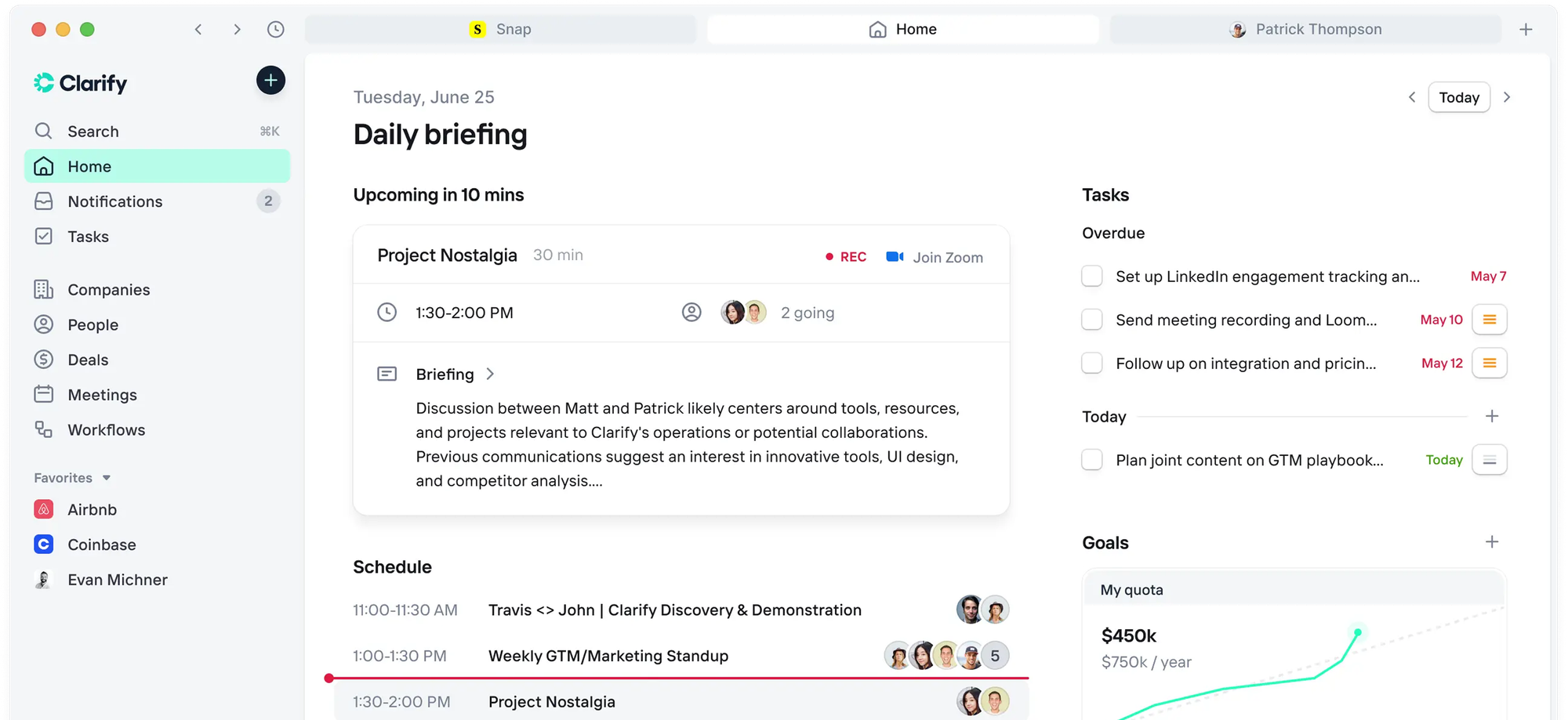
Coming in first is Clarify, an autonomous CRM that helps founders and early GTM hires sell more. Period. Importing leads, lead enrichment, call prep, and more are all automated by Clarify’s built-in AI. This isn’t a CRM with AI features tacked on; it’s the AI-native CRM for AI-native sales teams that want to spend less time on admin and more time doing what only humans can. Connecting.
Clarify’s strengths
- Leading the charge in autonomous features like automatic call capture, deal suggestions, and AI-driven task assignment.
- Modern, clean design reminiscent of tools like Linear or Notion.
- Deep Zapier integration capabilities so you can connect it with most of your apps.
- Pricing built for small teams with features that scale with you as you grow. More on this below.
Clarify’s pricing
Clarify’s pricing model is based on credits, which power Clarify’s AI. The more time you save with AI-powered tasks, the more credits you’ll use. Unlike other CRMs, Clarify gives you unlimited seats. Here’s a breakdown of Clarify’s plans:
- The Free plan is, well, free, and gives you 2,500 credits a month. You also get Core CRM features, standard data enrichment, deal intelligence, meeting intelligence, outbound email sending, built-in integrations, and email support.
- The Starter plan is $20 a month and gets you 5,000 credits a month, with the option to add 5,000 more for an extra $20. You also get everything in the Free plan, along with advanced data enrichment and chat support.
- The Growth plan is built for you from the ground up, with custom credit packages, a dedicated account manager, included CRM migration, and enhanced security like SCIM and SAML.
Best for: Fast-growing startups
If you want a CRM you can start using right now with AI that gives your sales team more of their day back, then Clarify is for you. The free plan allows you to see the impact of Clarify’s AI-native CRM before you make any big commitments, while the paid plans ramp up with you as you start closing more deals.
Stop looking for your CRM. Try Clarify for free.
#2 Salesforce Small Business: The go-to choice for the future enterprise
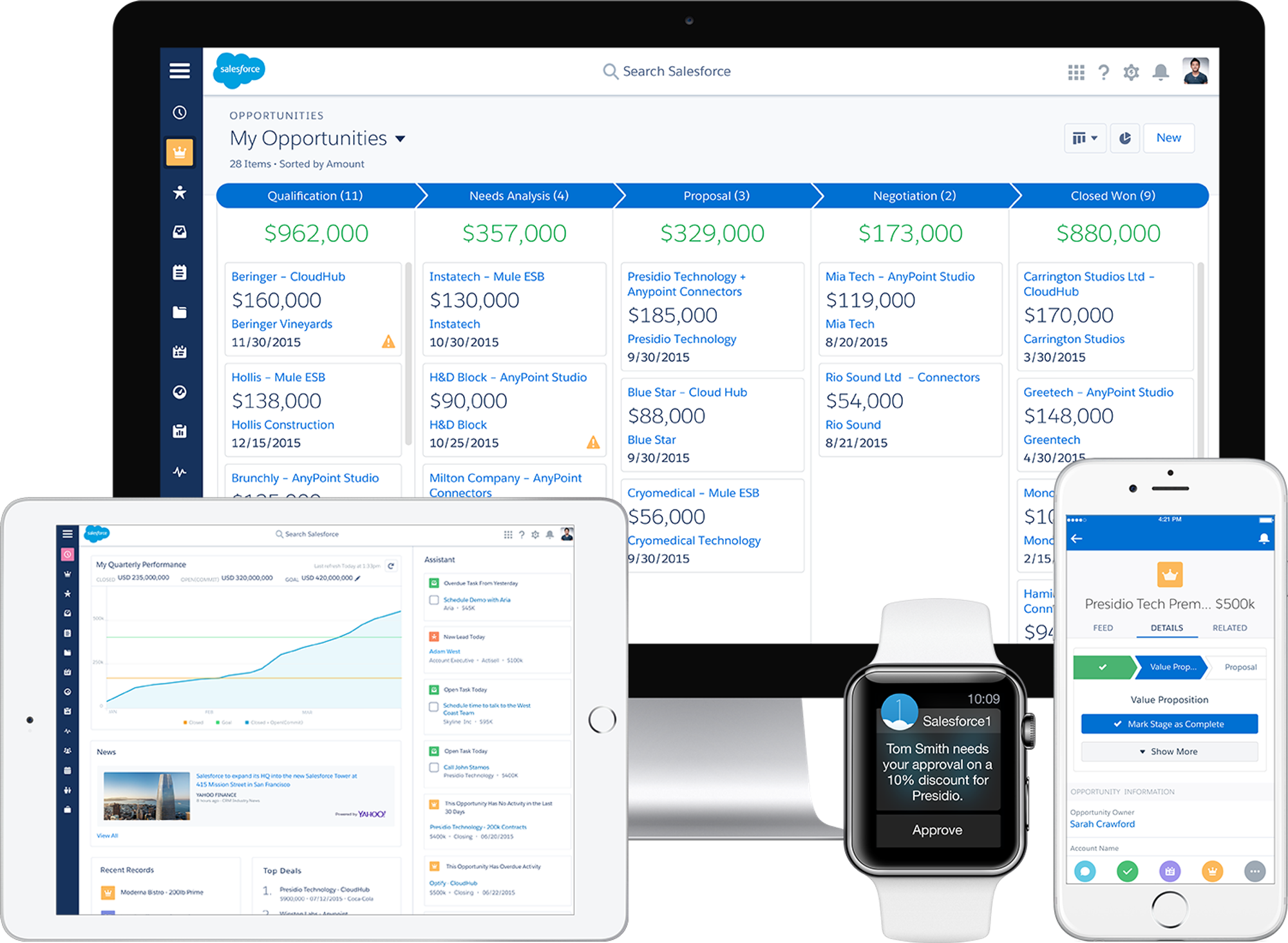
Salesforce is the biggest name in the CRM game. It ranks second in our list as one of the first players in the CRM space, typically aimed at enterprise-sized organizations. This makes it the reference point for CRMs, and its Small Business offering is aimed at getting founders onboarded on their first CRM so they can improve their sales and customer-facing game quickly.
Salesforce’s strengths
- Battle-tested and time-proven effectiveness.
- The largest portfolio of built-in integrations on this list.
- Robust automations and workflow builders.
Salesforce’s pricing
Salesforce offers three plans, with pricing scaling based on the number of users you have. This is the most common type of pricing with CRMs. Here’s what you can expect to pay for Salesforce:
- The Starter Suite is $25 per user, per month, and includes core CRM features like account and lead management, built-in meetings, a payment portal, customer success management, and more.
- The Pro Suite is $100 per user, per month, and includes everything in the Starter Suite plus real-time chat, greater customization, sales quoting, and access to AppExchange.
- The Sales Enterprise plan is $175 per user, per month, and adds advanced pipeline management, forecasting, opportunity scoring, web APIs, and Agentforce.
Best for: Small businesses ready to scale
If you know you’re going to scale massively relatively quickly, it might not be a bad idea to start with Salesforce as your CRM. That way, when you reach a certain size, you’ll already be familiar with the Salesforce environment as your usage grows.
#3 Zoho CRM: Competitively priced
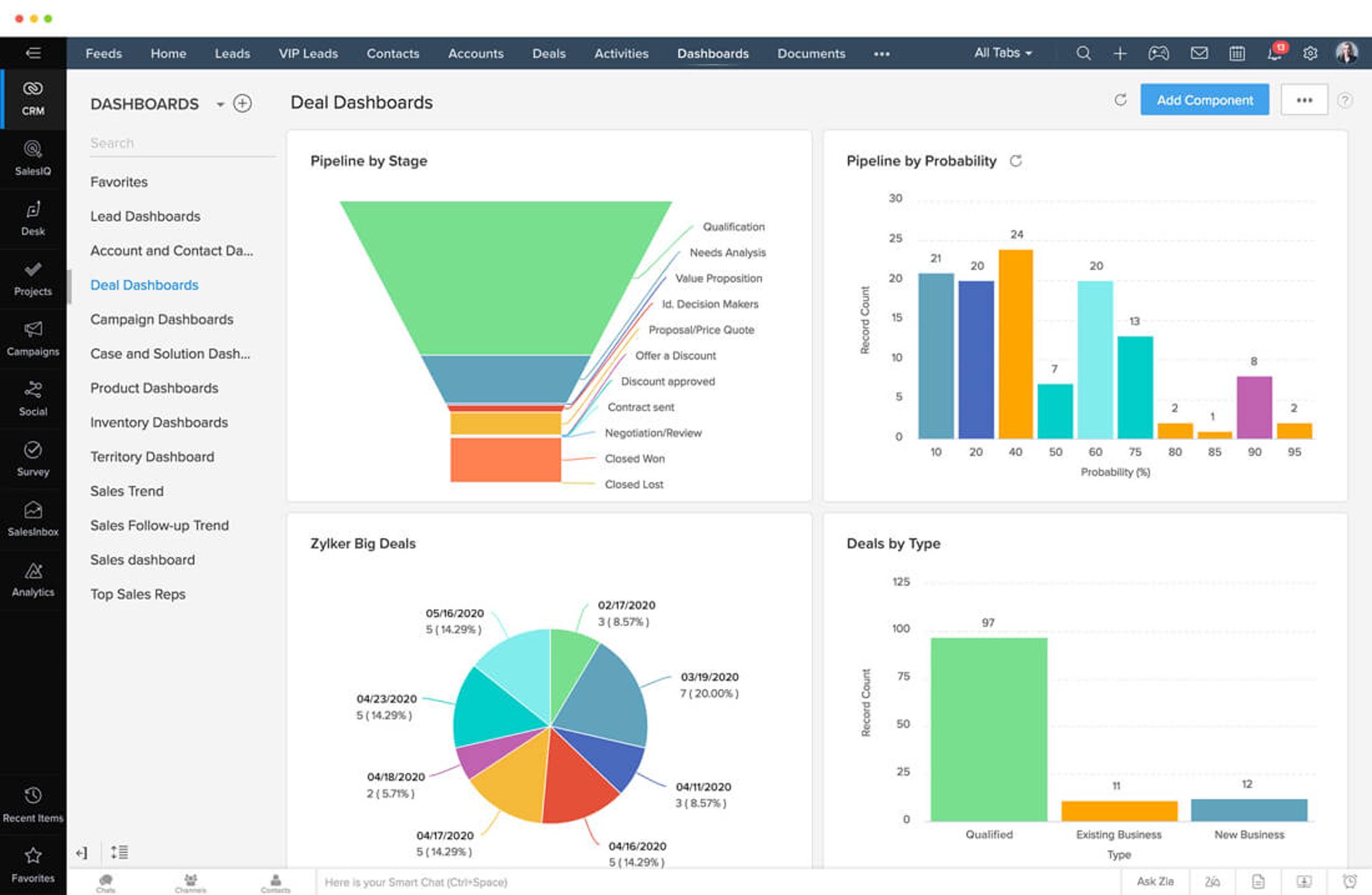
Zoho is a popular suite of software that includes everything from project management apps to marketing automation tools and HR tools. Zoho CRM is the company’s CRM offering, and it’s third on our list. A big reason for that? The price. It’s near-unbeatable on price. The second-biggest reason? It’s part of a suite of software that integrates natively with Zoho CRM, meaning you’ll have access to all your data as you add tools to your stack.
Zoho’s strengths
- Built-in Zia AI provides predictive lead scoring and intelligent recommendations.
- Centralized customer interactions and intuitive deal management.
- Part of a broader software suite that can handle all your business needs.
Zoho’s pricing
Zoho offers four pricing plans, based on a flat, per-user monthly fee. Here’s what you can expect to pay and what you’ll get:
- The Standard plan costs $14 per user, per month, and includes bulk emails, sales forecasting, workflows, Office 365 integration, and more.
- The Professional plan costs $23 per user, per month, and includes everything in Standard as well as inventory management, Google Ads integration, and deeper analytics.
- The Enterprise plan is $40 per user, per month, and adds unlimited custom reports, stronger lead scoring, and more advanced automation.
- The Ultimate plan costs $52 per user, per month, and allows for a custom machine learning platform, advanced customization, augmented analytics, and advanced administration.
Zoho also offers a free plan for up to three users, but it’s significantly more limited.
Best for: Bootstrapped businesses
If you have to make every dollar count, Zoho is one of your best options for a HubSpot alternative. It’s the most competitive option on price, while still scaling with you relatively well.
#4 Pipedrive: Visual deal management
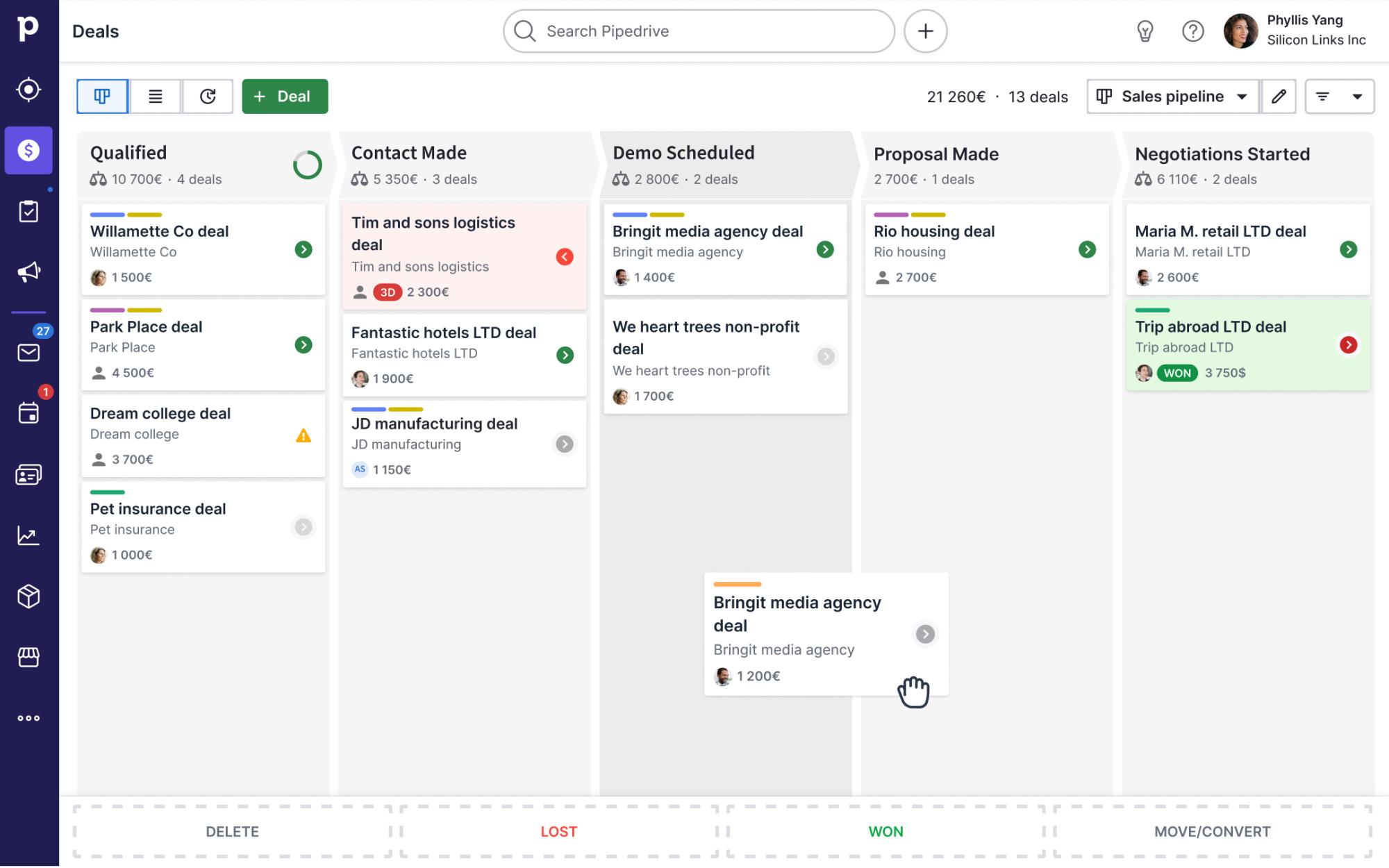
Pipedrive comes in fourth for visual pipeline management that makes it feel almost like a project management app instead of a dedicated sales tool, as well as its AI-powered deal management. Automated lead nurturing and deep integrations make it a great choice for your sales team.
Pipedrive’s strengths
- A drag-and-drop pipeline for tracking opportunities.
- AI-powered deal recommendations so you always know what to do next.
- Activity reminders to keep your teams on task and your managers out of the micromanagement spiral.
Pipedrive’s pricing
Like most CRMs, Pipedrive charges users based on the number of seats they need. Here’s what that pricing looks like:
- At $24 per user per month, the Lite plan gives you access to lead, calendar, and pipeline management, AI-powered reports, a real-time sales feed, and over 500 integrations.
- For $49 per user per month, the Growth plan adds full email sync with tracking, automations, nurturing sequences, subscriptions, forecast reports, a meeting scheduler, and more.
- At $79 per user per month, the Premium plan gives you lead generation and routing, custom scoring, company data enrichment, AI-powered multi-email tools, contracts, e-signatures, and enhanced customization.
- For $99 per user per month, the Ultimate plan adds fortified account security, phone and email data enrichment, maximized usage limits, and a sandbox testing account.
Pipedrive doesn’t have a free plan, but it does offer a free 14-day trial.
Best for: Sales-first businesses
Pipedrive gives you some of the best pipeline visibility and deal management on the market, making it a natural fit for service providers, consultants, and companies with fast, straightforward sales processes.
#5 Freshsales: All-arounder
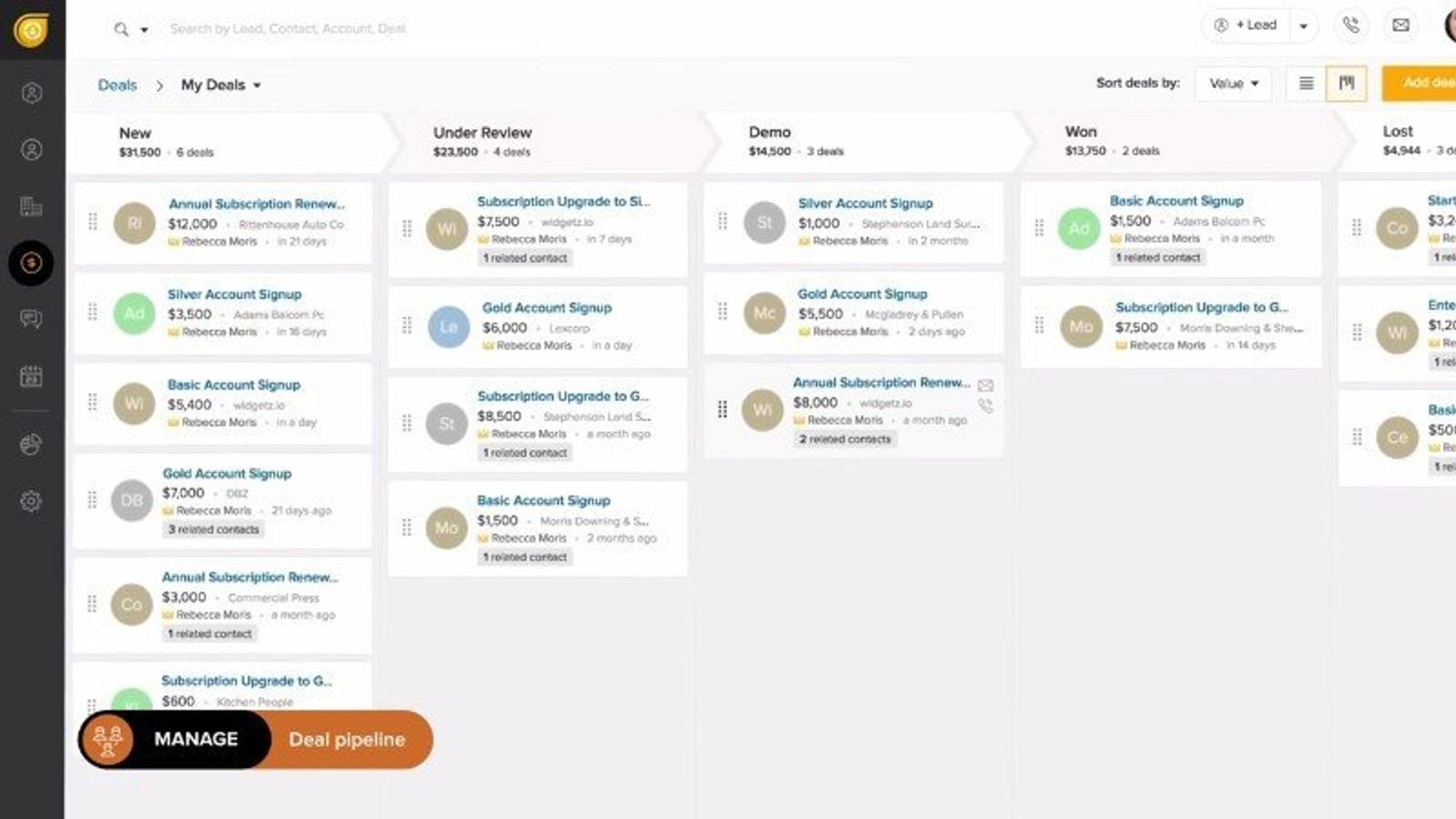
Fifth on our list is Freshsales, one of the strongest all-around CRM platforms out there, in part thanks to its Freddy AI. Kanban views and deep customer data combine to make this a powerful sales CRM.
Freshsales’ strengths
- Intelligent lead scoring powered by Freddy AI.
- Email tracking and optimization, with AI-suggested tweaks.
- Workflow automation that gets better over time.
Freshsales’ pricing
Here’s what you can expect to pay for Freshsales:
- The Growth plan is $11 per user, per month, and gives you a Kanban view for contacts, accounts, and deals, as well as contact lifecycle stages, built-in chat, email templates, basic workflows, and more.
- The Pro plan is a bit of a jump at $47 per user, per month, and adds Freddy AI-powered contact scoring, custom sales activities, territory management, sales sequences, and automated sales emails.
- The Enterprise plan costs $71 per user, per month, and adds field-level permissions, custom modules, AI-powered forecasting insights, and a testing sandbox.
Freshsales doesn’t have a free plan, but it does offer a free trial.
Best for: SaaS and tech startups
Freshales offers advanced AI and an API-first architecture that makes it a natural fit for teams with the technical resources to make the most of them.
#6 ActiveCampaign: Marketing automation CRM
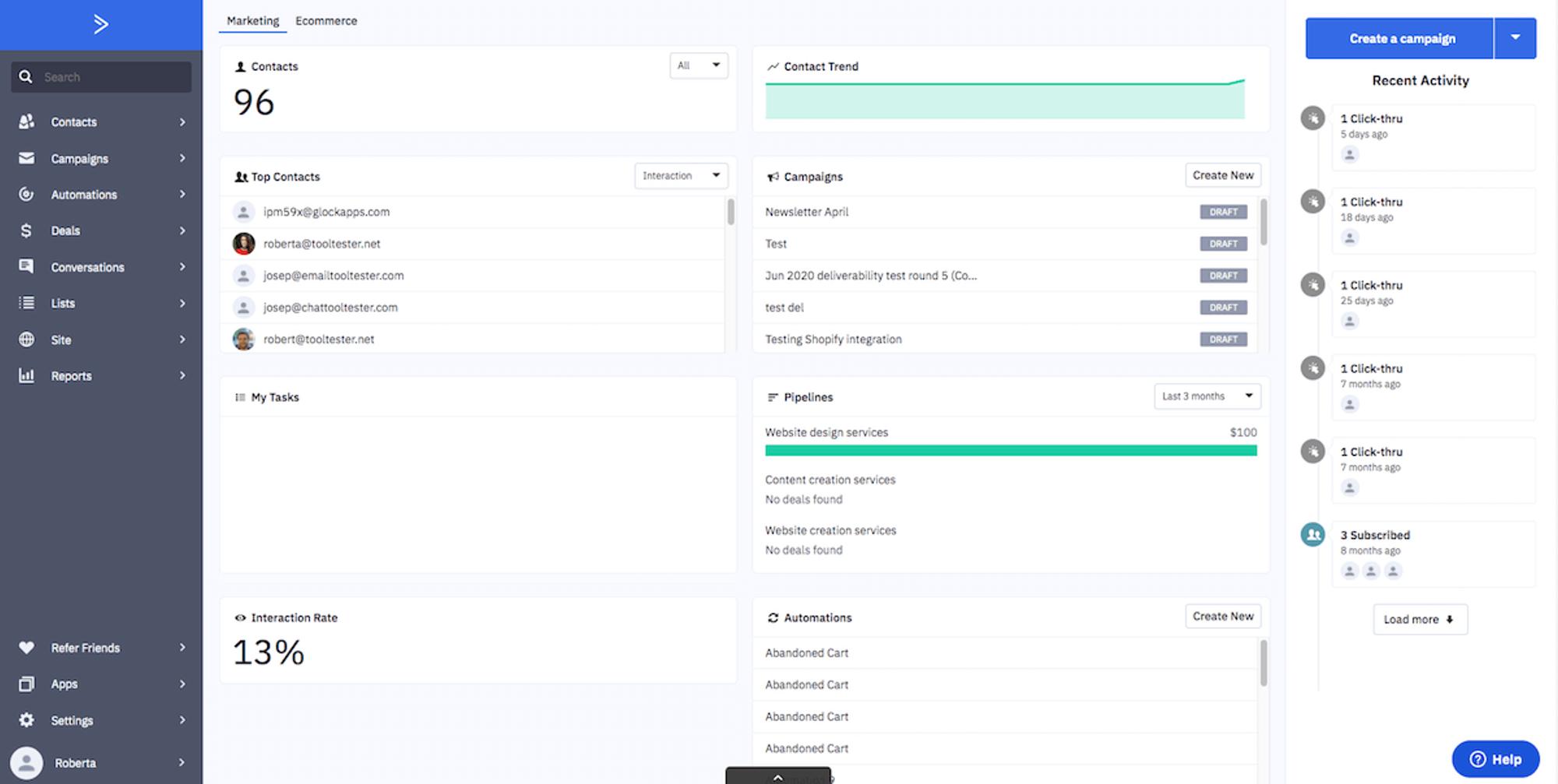
ActiveCampaign is aimed at marketers who need a dedicated CRM with powerful marketing automation. As an autonomous marketing platform, this tool gives marketers what they need to build better journeys and bring in better leads.
ActiveCampaign’s strengths
- A visual automation builder for more sophisticated email sequences.
- AI-powered predictive sending that sends emails at just the right time.
- Advanced segmentation for more targeted messaging.
ActiveCampaign’s pricing
ActiveCampaign’s pricing has two levers: the features you need and the number of contacts you’ll be emailing. Every plan starts at a price for 1,000 contacts and scales up from there. Here’s a breakdown of what you’ll pay:
- The Starter plan starts at $15 a month for 1,000 contacts and scales up to $391 a month for 25,000 contacts and a single user. It limits your actions to five per automation, your email sends to ten times your contact limit, and has limited features beyond automated email sending.
- The Plus plan starts at $49 a month for 1,000 contacts and scales up to $609 a month for 50,000 contacts and a single user. It also gives you unlimited actions, landing pages, generative AI, and more.
- The Pro plan starts at $79 a month for 1,000 contacts and scales up to $969 a month for 50,000 contacts and up to three users. It also adds condition content, predictive sending, advanced reporting, attribution and conversion tracking, and more.
- The Enterprise plan starts at $145 a month for 1,000 contacts and scales up to $1,169 a month for 50,000 contacts and up to five users. It gives you premium CRM integrations, premium analytics, single sign-on, and a dedicated account team.
Best for: Marketing top-performers
ActiveCampaign won’t do much for your sales team, but it’ll give your marketing team a powerhouse tool for bringing in and nurturing leads. If your growth is primarily marketing-driven, this could be the CRM for you.
#7 EngageBay: The build-a-CRM
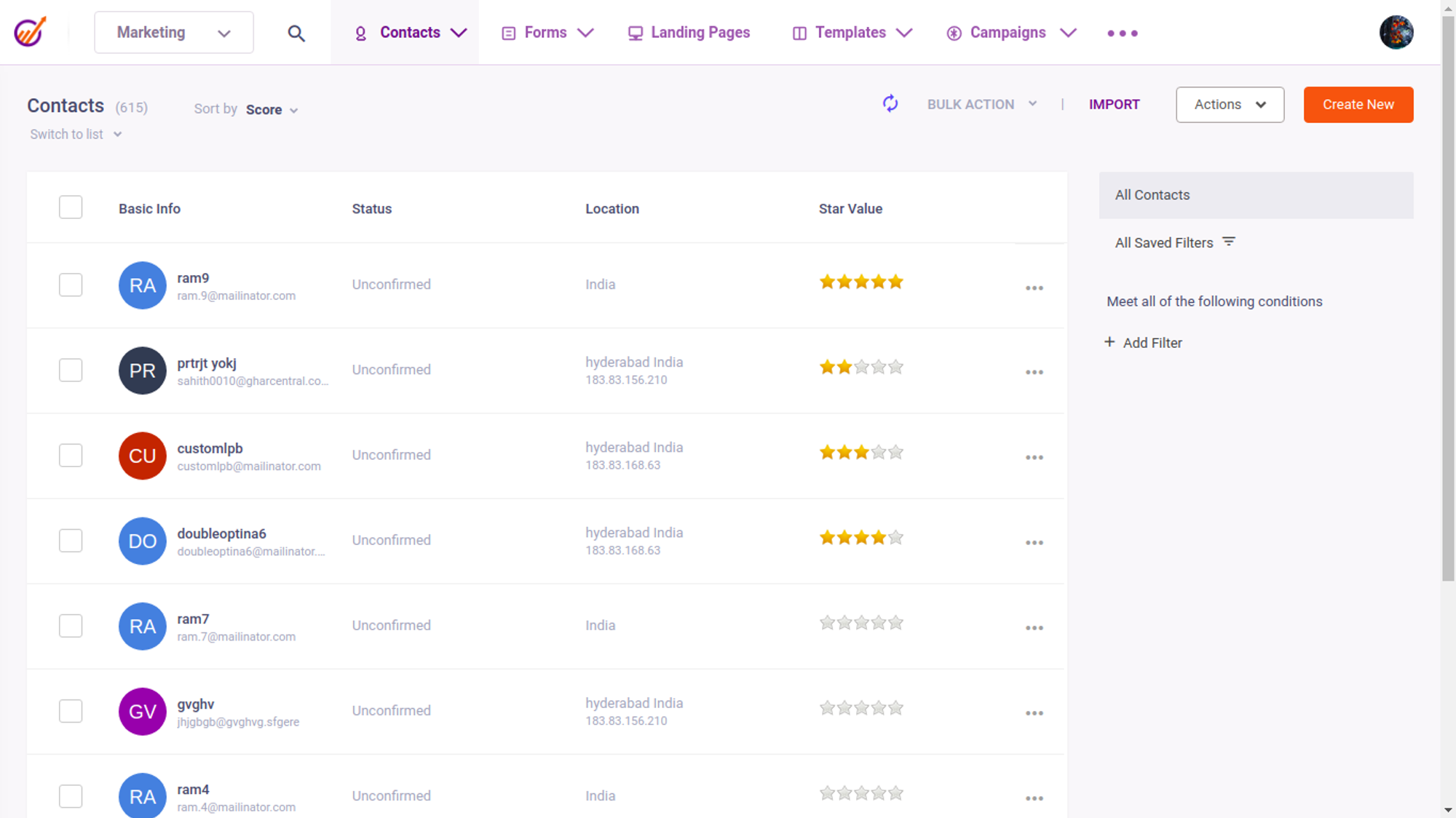
Last on our list is EngageBay, a robust CRM platform with one of the most flexible free plans on the list. If Zoho CRM is too expensive for you, then EngageBay might be the CRM you need. And when you’re ready to pay, you can pick and choose the features you need.
EngageBay’s strengths
- Only pay for the features you need, whether that’s the marketing suite or the CRM and Sales Bay. The help desk and live chat features are free forever.
- Drag-and-drop landing page builder.
- A free CRM robust enough for many small businesses.
EngageBay’s pricing
EngageBay allows you to choose whether you only want to pay for the marketing suite or the CRM and Sales Bay. For the scope of this guide, we’re only looking at the CRM and Sales Bay pricing here.
- The Free plan supports up to 250 contacts, giving you contact management, deal tracking, task management, email tracking, and more.
- The Basic plan is $12.99 per user per month, doubles your number of contacts, gives you multiple deal tracks, in-app calling, predictive lead score, and third-party integrations.
- The Growth plan is $49.99 per user per month, ups your contacts to 20,000, and adds an email scheduler, leader board, sales automation, and more.
- The Pro plan is $79.99 per user, per month, and supports 30,000 contacts, an auto dialer, proposal analytics, role management, call records, call scripts, and more.
Best for: Starting with the free plan
EngageBay’s free plans are robust enough for most small business founders, making it one of the best HubSpot alternatives to start with. As your needs increase, you can pick and chose the features you want so your monthly bill stays lower than some other options on this list.
Frequently asked questions
How do I migrate data from HubSpot to a new CRM?
Some CRMs support direct integration with HubSpot, making your migration as simple as flipping on a switch. In other cases, you’ll need to either export your HubSpot data as a CSV file or pay for a third-party integration solution.
Which alternative offers the strongest AI automation?
Clarify is built from the ground up as an autonomous CRM for AI-native companies. Freshsales is a strong all-around CRM with strong automation, while ActiveCampaign is the AI-powered tool of choice for marketers.
How can I avoid disruption during a CRM switch?
It’s best to migrate slowly, over time, and at your own pace. Start with small amounts of data, and train just a few team members on your new tool. You’ll need to budget some time for testing workflows, configuring integrations, and gradually integrating advanced features. It’s not as simple as shutting down one tool and moving everyone to the new one.
What should I prioritize after implementation?
Train team members on individual workflows in the new tool, and make sure you configure essential automations and integrations. Scheduling weekly check-ins for the first few months of a migration can quickly surface issues with the new tool, so you can resolve them quickly.
Get our newsletter
Subscribe for weekly essays on GTM, RevTech, and Clarify’s latest updates.
Thanks for subscribing! We'll send only our best stuff. Your information will not be shared and you can unsubscribe at any time.